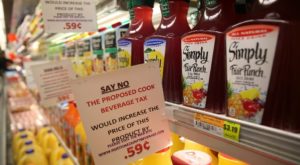
It’s a bit odd that liberals can grasp basic economic consequences when it’s convenient for them.
They’ll ignore economic laws on the minimum wage, the consensus being that making labor more expensive leads to less of it being employed. Common sense, right? That’s why liberals support taxing soda or unhealthy foods to discourage their use, while subsidizing solar power to encourage its use.
And they’re right in those cases at what the end results will be….. sort of. Earlier this year, the city of Philadelphia passed a 1.5 cent per ounce tax on soda and other sweetened and “diet” beverages, and if their goal was to reduce soda consumption, they succeeded. In fact, purchases of soft drinks in Philadelphia fell 50 percent following the tax! But as you’d expect, when the tax affected only those in Philadelphia, such a tax merely encouraged people to purchase their soft drinks elsewhere. They had good reason to, as a $5.99 6-pack of Propel flavored water was hit with a $3.04 tax -the equivalent of over 50 percent of the retail price. A 12-pack of Gatorade in Philly will set you back over $20 bucks.


As a result of the decline in sales in Philly, Pepsi had to lay off roughly a quarter of their workforce in that city.
There were similar results at the country level in Denmark, which dropped the nation’s “fat tax” (a tax of $2.7 per kilogram of saturated fats in a product) after it had been in effect for just over a year because they found people simply ventured across the border to purchase their snacks.
You’ve probably heard the cliche that “the definition of insanity is trying the same over and over again and getting a different result” twelve billion times by now, but it truly is perfect when it comes to pointing out policy failures that could’ve been easily avoided had anyone bothered to look at how they played out in the past.
The most recent city to implement a soda tax is Chicago, a city that would probably be better off with a bullet tax. The tax technically affects Cook County, Illinois, but that encompasses primarily Chicago.
And what happened? Just what you’d expect. The city implementing the tax pays the fiscal burden as soda sales tank, while consumption remains constant because people ventured to neighboring areas to purchase their soda. According to HotAir, “in the latest salvo over Cook County’s controversial sweetened beverage tax, retailers trotted out numbers to back up their demand to repeal the tax.”
The report continues: “The local retailers report that more than 4 in 10 local stores have seen a drop in beverage sales of at least 30%.”
Illinois Democrat House Speaker Mike Madigan is currently considering legislation to repeal the tax.
In other words, the tax was such a failure that even Democrats are trying to ditch it.
Share this story with others to show them that taxes always make things more expensive!
